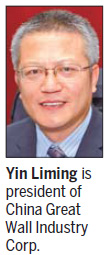Top Stories
Satellite launch goal set
By Xin Dingding (China Daily)
Updated: 2010-10-21 14:18
 |
Large Medium Small |

China seeks bigger share of global market as major contracts loom
BEIJING - China is set to re-launch itself on the global aerospace industry and become a major player in the commercial satellite market, a senior industry official said.
Yin Liming, president of China Great Wall Industry Corp, told China Daily on Wednesday that his company aims to take a 10 percent share of the world's commercial satellite market, and 15 percent of the commercial launch business by 2015.
It is the first time the corporation, the only one in China authorized to conduct commercial launches for international customers, has unveiled a specific target.
China will conduct three commercial launches next year, including a communications satellite produced by France-based Thales Alenia Space for Eutelsat Communications, according to the corporation.
The other two launches, also communications satellites and both made in China, will be the PakSat-1R for Pakistan, and the NigComSat-1R for Nigeria, to replace a defunct Nigerian satellite launched in 2007.
The corporation has three more contracts to fulfill after 2011 - building and launching a broadcast and telecommunications satellite for Laos, and launching two communications satellites produced by Thales for Hong Kong-based APT Satellite Co Ltd.
The corporation is confident that more contracts will be signed as it is in talks with a number of countries, mainly from the developing world.
The corporation plans to "invest hundreds of millions of yuan in the next few years", Yin said, "for a batch of communications satellites and launch vehicles", to guarantee service.
Previously, satellites and launch vehicles were purchased only after contracts were signed.
"This new business model will help sharpen our competitive edge in the global launch market. We aim to become a major player," he said.
It also plans to strengthen market research and international cooperation, he added.
Thales is also "looking at strengthening the partnership" with the corporation, Olivier Guibert, president of Thales China and North Asia, said at a ceremony on Wednesday marking the 30th anniversary of the China Great Wall Industry Corp.
Five Thales satellites have entered space atop China's Long March launch vehicles since 1998. Three more Thales satellites will be launched from China during the next few years, according to China Great Wall Industry Corp.
China initially entered the commercial launch market in the 1990s, and once enjoyed a 9 percent share of the global business thanks to the reliability of its launch vehicles.
However, it experienced a major setback on Feb 15, 1996, when the launch of the Intelsat 708 satellite failed.
Starting in 1999, the United States banned the export of satellites to China containing components covered under the US International Traffic in Arms Regulations (ITAR).
Due to this trade barrier, China was stripped of opportunities in the market and did not conduct any commercial launches between July 1999 and March 2005.
That year, China re-entered the market by launching satellites that were manufactured in Europe or China without ITAR-controlled components.
Between 2005 and 2009, China launched two China-made Dongfanghong-4 communications satellites for Nigeria and Venezuela, and launched four satellites manufactured by Thales for Chinese and foreign customers, according to the corporation.
Over the last three decades, China conducted 30 commercial launches for 14 countries and regions, putting a total of 36 satellites into orbit.
The Dongfanghong-4 satellite has been exported to developing countries in Asia, Africa and Latin America to provide communication services for 10 percent of the world's population.
China Daily